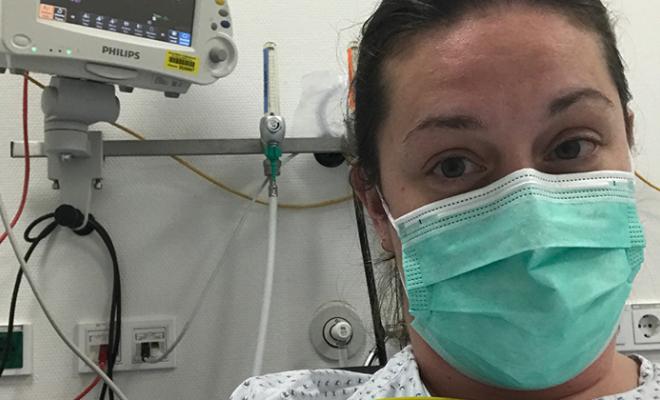When I was 12 years old, I had to be admitted to the hospital, via the ER, with what turned out to be DIOS -- a bowel blockage. Since I had been born with meconium-ileus, I had a vague understanding of what a bowel blockage meant and was terrified out of my mind that I would need surgery. Fortunately, the DIOS could be resolved without surgery. However, what has stayed with me to this day is the trauma that I suffered during the 48 hours in the hospital. Therapy has helped me understand how this and similar past experiences have affected how I advocate for myself effectively in the present.
Even before that episode with DIOS, I had struggled with medical visits. As a child, I felt scared and helpless at the cystic fibrosis center, and during exams and procedures I often didn't receive age-appropriate explanations of what was going to happen to me. I learned early that CF and its treatments were scary and unpredictable. I wasn't in control of my body -- CF and the doctors were. I reacted to this loss of bodily autonomy with aggressive behavior -- I often refused to cooperate and lashed out verbally at the medical staff.
To the staff at my pediatric CF center, I was “difficult,” “annoying,” and, overall, a bother. Apparently, in Germany during the 1990s, psychological training was not part of pediatrics care. Neither was empathy.
The day I was admitted for DIOS confirmed this lack of understanding from my medical team among many who treated me. I don't fully remember all the details of the exam from the on-call doctor that evening, except that while I was lying on the scratchy paper covering the exam table, he told me to turn to the side and pull my knees up to my chest. I asked him why, but instead of explaining that he wanted to give me a rectal exam to check for bleeding, he turned me forcibly and performed the exam without warning or consent.
During an ultrasound exam a little later, which was performed by a different doctor, I kept asking whether he could “see” anything, since I was still terrified of needing surgery. Apparently, this was so annoying to him that he finally asked angrily, “Do you want me to find something?” which shut me up. This doctor did confirm the DIOS, so I was admitted for 48 hours of humiliating procedures of enemas and laxatives. Although after treatment the DIOS was gone, the trauma stayed with me.
In the following years, I continued to experience situations in which I did not receive age-appropriate explanations and often was examined in front of several doctors without proper consent or concern for me -- a shy teenage girl. So I continued to behave aggressively during those encounters.
Things improved slightly when I switched to adult care, and later when I moved to a new city and a new CF center where I found a doctor who took my mental health into account. Around this time, I also started seeing a therapist.
But even as an adult, I continued to exhibit the “bad behavior” of my childhood days in medical settings. If I felt that I wasn't listened to, if I was left waiting for hours without updates, if I had to undergo exams or procedures and felt I wasn't in control, I lost my carefully maintained composure. Again, I was difficult and non-compliant. I was afraid to seek medical help even if I needed it. And I was deeply ashamed of my apparent lack of good upbringing and manners and my childish transgressions. I kept wondering: Why was I such a bad CF patient?
I had years of therapy for depression and anxiety (about which I have written in another blog post). But, I was unable to make a connection between my anxiety disorder which manifested itself as a fear of loss of control of my body (I was afraid to get sick) and the years of traumatic hospital experiences during my childhood (of which the DIOS experience is only one particularly harrowing example).
Only during the past year, with a therapist (who listened to my initial suggestion that maybe some childhood experiences were to blame for my difficulty handling hospitals), have I been able to start dealing with my trauma.
My therapist uses both cognitive behavioral therapy and Eye Movement Desensitization and Reprocessing. EMDR is a therapy used to treat Post-Traumatic Stress Disorder. During sessions, I relive parts of a traumatic event by recalling it in as much detail as possible, while my therapist moves her hand side-to-side in front of my eyes to direct my eye movement.
This treatment, together with speaking about what happened to me, recognizing that my experiences were indeed traumatic, and acknowledging that my emotions are valid, has helped me to better manage my fears and aggressions when I visit my CF center or have to be admitted. I now know that my “bad behavior” was influenced by untreated trauma and that it was an attempt to fend for myself and to preserve control.
Therapy has enabled me to speak up calmly if I feel that I am not in control and to advocate for my emotional wellbeing by asking for explanations before and during procedures. Sometimes I still get angry, but now I usually calm down faster.
When I had to be admitted for a possible DIOS a few weeks ago, I was able to navigate the diagnostic process completely differently, calmly advocating for myself, which showed me what a difference therapy and community support has made for me.
I only wish I had understood sooner that trauma does not necessarily have to be caused by one threatening event like experiencing a battle, a terrorist attack, or a terrible accident, but that experiencing numerous difficult situations that threaten your feeling of control and bodily autonomy over time can be equally traumatizing.
CF is not traumatizing for everyone, and CF centers and pediatric practices now pay much more attention to CF's psychological toll. But, as I have learned through many wonderful CF community members, some of us have indeed had traumatic experiences which cause us difficulty in the present. We're not “bad” patients -- some of us just struggle with trauma. If you're reading this: it's okay to voice your experiences -- even if they feel “small” or “unimportant” -- and to get help. You're not alone. Facing those experiences can help you become a better advocate for your emotional well-being.
Interested in sharing your story? The CF Community Blog wants to hear from you.




